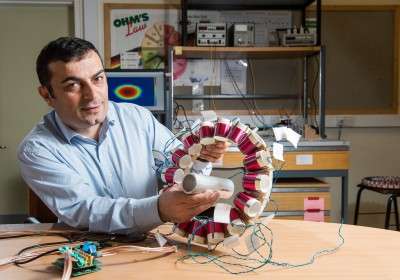New imaging technology could help save UK/EU steel industry

A researcher from the University of Bath has been awarded a new grant to develop an innovative way of assessing a key stage of the production of steel, greatly benefitting the competitiveness of the UK and EU steel industry.
The 'Shell-Thick' project will develop an innovative induction tomography system for assessing the solidification process of metal. This new system will significantly improve the continuous casting process of steel by providing a real-time, non-destructive and reliable method of measuring the molten steel to detect any defects or fails as it solidifies and becomes a market product.
The system will form a kind of contactless bracelet around the billet of molten steel and take continuous measurements as the steel solidifies. It will visualise the electrical conductivity of the different states of the solidifying steel and therefore provide an image of the structural composition of the steel as it cools.
By enabling industry to continuously monitor and alter the cooling process of steel, this innovative method will improve the quality, safety, productivity, costs and ultimately competitiveness of the UK and EU steel industries.
Induction tomography is a new and emerging non-invasive imaging technique used in a number of applications including medical diagnostics, geophysical exploration and civil engineering.
The EU and particularly UK steel industry is currently in a desperate state and facing widespread job losses due to its inability to compete with the highly subsidised steel industries in China. Steelworks such as the Tata Steelworks at Port Talbot are currently in emergency talks to try and prevent the plant closing. It is hoped this technology may help the UK/EU steel industry become more competitive and have greater job security in the long-term future.
The University of Bath works closely with its industrial partners in the UK and across the EU to bring innovation to the marketplace, delivering impactful research to industry and society.
Dr Manuch Soleimani from the University of Bath's Department of Electronic & Electrical Engineering has received an EU Horizon 2020 grant to lead this three year project and will work with colleagues at the Fundacion Tecnalia Research & Innovation in Spain as well as Italian steel industry companies Ferriere Nord and Ergolines Lab.
Dr Soleimani, Associate Professor in the University's Department of Electronic & Electrical Engineering, said: "We are delighted to play a critical part in this project by using world-leading techniques in our Engineering Tomography Lab, in the area of electromagnetic imaging.
"This is an exciting and yet very challenging project that will have a great impact in helping in the competitive production of high quality steel, which is very important for the sustainable future of the UK and European steel industry."